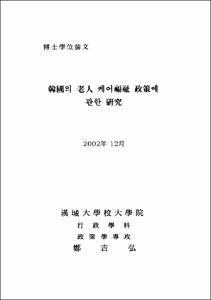韓國의 老人 케어福祉 政策에 관한 硏究
= (A) Study on the Elder Care Policy in Korea
- Files in This Item:
-
-
Download
 000000066343.pdf
기타 데이터 / 8.4 MB / Adobe PDF
000000066343.pdf
기타 데이터 / 8.4 MB / Adobe PDF
-
Items in Repository are protected by copyright, with all rights reserved, unless otherwise indicated.